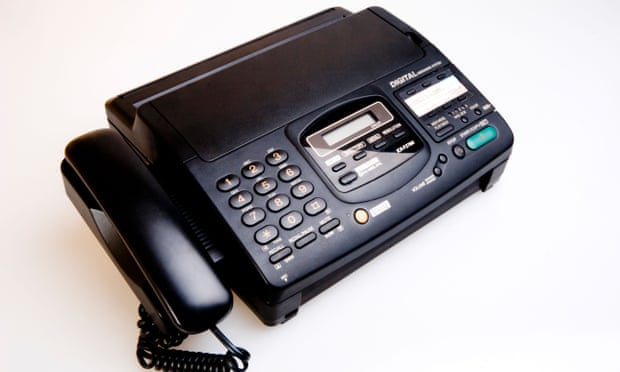
Internet activists determined to halt what they see as another ill-conceived Washington cybersecurity bill are hitting Congress where it hurts: right in the fax machine.
Protesters have programmed eight separate phone lines to convert emails sent from a handy box at FaxBigBrother.com (as well as tweets with the hashtag #faxbigbrother) to individual faxes and send them to all 100 members of the US Senate.
The rationale, said Evan Greer of activist group Fight for the Future, is that Congress doesn't appear to understand technology invented in the current century.
"Groups like Fight for the Future have sent millions of emails, and they still don't seem to get it," said Greer. "Maybe they don't get it because they're stuck in 1984, and we figured we'd use some 80s technology to try to get our point across." All 100 members of Congress will receive each of the faxes.
The deluge of badly printed screenshots is in protest of the the Cybersecurity Information Sharing Act (CISA), sponsored by California Democrat Dianne Feinstein, which proposes cooperation between government agencies and private tech companies and gives the latter broad latitude to collect as much data as possible from users in the name of cybersecurity and then share it with specific federal agencies, who in turn have latitude to share it with all federal agencies.
Findings shared by companies who work with the government will be specifically exempt from the Freedom of Information Act (Foia) and all other attempts by the public to learn exactly what pieces of their data are being collected, scaled and leafed through. Fans of the bill include Facebook, Google, AT&T, Comcast, Bank of America and Blue Cross Blue Shield.
The bill, stalled last year, has been recently resuscitated and will likely be considered next week before Congress adjourns for the summer on 7 August.
Do US senators really use their fax machines that often, though? "Yes, sadly," one former Senate staffer told the Guardian. They love their pagers as well. Faxes "all get digitized by the time they get to the office, though", which bodes ill for senatorial email inboxes.
And why is 1979's hottest tech trend still so popular on Capitol Hill? "One thing that makes faxes – and pagers, for that matter – still good tech is that they are analog and difficult to search. Members love them, especially to transmit data for things like campaign financing records."
It is, in other words, a great way for American elected officials to obey the letter of the law when it comes to campaign disclosures and Foia requests without exposing themselves to the kinds of invasive data-crunching to which the general public will be prey, should CISA pass. "No one wants to read" the transmissions, the ex-staffer said. "Readers get lost in them, but there is still a record of info being sent and received."
But there's still pressure on Congress to act on cybersecurity worries, especially after the recent hack of the Office of Personnel Management (to say nothing of the security problems at Target, Sony and a dozen other high-profile companies).
Matt Comyns, global cybersecurity practice leader with executive search firm Russell Reynolds, said there were great risks from simply letting the current arc of cybercrime take its course. "We are living in a new world and need to adjust our thinking and behavior," he said. "The obvious risk to CISA and more regulation from the government is the abuse of privacy. However, the government seems to have decided that is the potential cost of creating a more secure environment for companies and US citizens."
Greer had a different take. "With all these breaches," she said, "there's a lot of fearmongering going on in DC. They just say: 'This is a problem – we've got to do something!' And this is the something they're going to do. It's not just that this won't fix things – it'll make them worse. And it'll give sweeping legal immunity to some of the largest companies in the world and open us all up to new forms of surveillance."
This entry passed through the Full-Text RSS service - if this is your content and you're reading it on someone else's site, please read the FAQ at http://ift.tt/jcXqJW.
http://ift.tt/1h374ZJ Internet activists are sending thousands of FAXES to Congress to oppose CISA cybersecurity bill via top scoring links : news http://ift.tt/1DJv5d4
Put the internet to work for you.
No comments:
Post a Comment